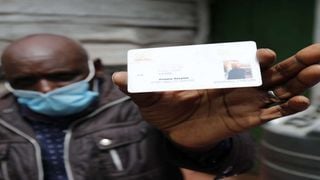
A man from Nyeri shows his UHC card.
| Joseph Kanyi | Nation Media GroupNyeri
Premium
Pain for UHC beneficiaries as Nyeri ends programme
Patients in Nyeri have started paying for medical services that have been free during the pilot phase of the Universal Health Coverage (UHC) which has ended.
This is after the end of a two-month grace period given to Nyeri residents to register and update their National Health Insurance Fund (NHIF) as the county was suffering a cash crunch and could not sustain free medical services.
The UHC pilot was meant to provide publicly-funded healthcare to about 3.5 million people in Nyeri as well as Isiolo, Machakos and Kisumu counties.
UHC is part of President Uhuru Kenyatta's Big Four Agenda. Last week, Mr Kenyatta launched the biometric registration of the State-funded UHC scheme beneficiaries.
He said the project had led to an increase in the utilisation of health services, with over 1.6 million additional hospital visits made during the 12 months of the UHC pilot phase.
Community health units
Other key achievements of the pilot phase as explained by the Head of State were the establishment of an additional 208 community health units, staffed by 7,700 community health volunteers and additional recruitment of 752 health workers.
Mr Kenyatta also called for the scaling up of NHIF reforms to boost UHC.
In the Nyeri case, the county, in a notice at the Nyeri Referral hospital, alerted patients that the administration would no longer support free services under the UHC.
“As informed earlier, patients are expected to clear their bills either under NHIF or any other medical insurance as well as cash for both outpatient and inpatient,” read the memo by Hospital Medical Superintendent Robert Ngunjiri.
No further admissions
Dr Ngunjiri further noted that only patients who had been admitted under the free programme will be discharged without cost, adding that there will be no further admissions under the UHC.
With the introduction of hospital charges, the county intends to increase its revenue that had tipped by over 50 per cent due to lack of payments.
Nyeri had been picked for the UHC pilot programme because of the prevalence of non-communicable diseases such as hypertension, diabetes and cancer.
The pilot project was supposed to end last December but an extension was signed by governors of the four counties for an extra three months, until March 13.
This was done with no extra resources to cater for operations and treatment of patients, meaning that the county governments were forced to use their budgetary allocations to continue with the programme.
“We have strained development and funding to other departments as we channel funds to finance the free healthcare and it is no longer sustainable,” Health Chief Office Newton Wambugu explained.
Poor flow of funds
Since the roll-out, counties have grappled with poor flow of funds, shortage of personnel against a huge number of patients spurred by the availability of free services.
Data from the health department shows that Nyeri county was allocated Sh359 million to facilitate the UHC programme but it received Sh159 million by the end of the pilot phase on December 13 last year.
Accustomed to free services, a majority of the residents say they cannot afford to pay the Sh500 monthly contribution to NHIF, especially people living below the poverty line.





